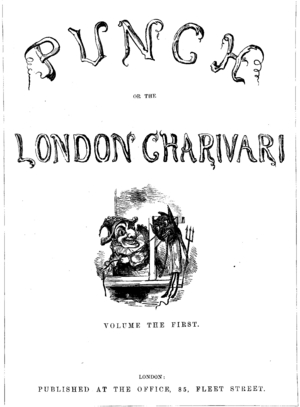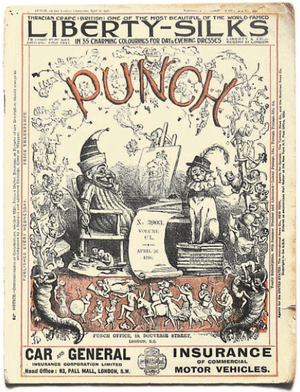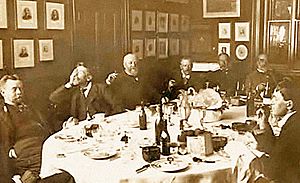Punch magazine facts for kids

Cover of the first Punch, or The London Charivari, depicts Punch hanging a caricatured Devil, 1841 (see gallery below for enlarged detail)
|
|
| Categories | Politics, culture, humour, satire |
|---|---|
| Frequency | Weekly |
| Founder | Henry Mayhew, Ebenezer Landells |
| Founded | 1841 |
| First issue | 17 July 1841 |
| Final issue | 1992 |
| Country | United Kingdom |
| Based in | London |
| Language | English |
Punch, or The London Charivari was a very popular British magazine. It was published every week and was full of humour and satire. Satire means using jokes and funny drawings to comment on important topics, like politics or society.
The magazine started in 1841. It was created by Henry Mayhew and Ebenezer Landells. Punch became very important in the 1840s and 1850s. It even helped create the modern meaning of the word "cartoon" for a funny drawing.
Punch was published for a long time. It closed in 1992 after 150 years. It was brought back in 1996 but closed again in 2002.
Contents
The Story of Punch Magazine
Punch magazine began on July 17, 1841. Its founders were Henry Mayhew and Ebenezer Landells. At first, Mayhew and Mark Lemon were the main editors.
The magazine's full name was The London Charivari. This was a nod to a similar funny magazine in France called Le Charivari. They chose the name Punch after the famous puppet, Mr. Punch. The name also made a joke about one of the first editors, Lemon, saying "punch is nothing without lemon."
Mayhew stopped being a joint editor in 1842. He left the magazine completely in 1845. Punch magazine is famous for giving us the modern meaning of the word 'cartoon'. Before Punch, a cartoon was a type of drawing for a painting. But Punch used it for funny drawings.
The cover design changed a few times early on. In 1849, Richard Doyle designed the famous image that appeared at the top of the magazine.
The magazine was most popular in the 1940s. At its peak, about 175,000 copies were sold each week. But over the years, fewer people bought it. This led to the magazine closing down in 1992 after 150 years.
Punch Magazine Returns
In early 1996, a businessman named Mohamed Al-Fayed bought the rights to the Punch name. The magazine was launched again later that year.
However, the new version of Punch never made a profit. In May 2002, it was announced that Punch would close again. Reports said that the owner lost about £16 million (around $28 million U.S.) over six years. By the end, only about 6,000 people subscribed to the magazine.
People Who Worked on Punch
Many talented people worked on Punch magazine. Here are some of the editors during its first 150 years:
- Mark Lemon (1841-1870)
- Henry Mayhew (1841-1842)
- Charles William Shirley Brooks (1870-1874)
- Tom Taylor (1874-1880)
- Sir Francis Burnand (1880-1906)
- Sir Owen Seaman (1906-1932)
- E.V. Knox (1932-1949)
- Kenneth Bird (1949-1952)
- Malcolm Muggeridge (1953-1957)
- Bernard Hollowood (1958-1968)
- William Davis (1969-1977)
- Alan Coren (1978-1987)
- David Taylor (1988)
- David Thomas (1989-1992)
Many famous cartoonists drew for the magazine. These include Murray Ball, John Leech, Edward Linley Sambourne, John Tenniel, Norman Thelwell, Gerald Curtis Delano, and George du Maurier.
Well-known authors also wrote for Punch. Some of them were Kingsley Amis, John Betjeman, A. P. Herbert, A. A. Milne (who wrote Winnie the Pooh), Thackeray, and P.G. Wodehouse.
Interesting Facts About Punch
- Punch gave us some common phrases in the English language. One example is "Curate's egg". This phrase describes something that is only partly good.
- Some classic British humour books first appeared in Punch. These include Diary of a Nobody and 1066 and All That.
- The famous novel Vanity Fair was first published in parts in Punch in 1847 and 1848. It was then made into a book.
- The British Library bought all of Punch's old magazines and other items in 2004.
- A cigar company, Punch Cigar Co., was named after Mr. Punch. This was done to attract British customers.
- Cartoons from Punch magazine are often used in GCSE and Higher History exams. They help students understand how British people felt about different issues in the past.
Images for kids
-
"True Humility": Bishop: "I'm afraid you've got a bad egg, Mr Jones"; Curate: "Oh, no, my Lord, I assure you that parts of it are excellent!" George du Maurier, originally published in 1895
-
John Tenniel's "Our New 'First Lord' at Sea" for the 13 October 1877 issue
See also
 In Spanish: Punch (revista) para niños
In Spanish: Punch (revista) para niños
 | Kyle Baker |
 | Joseph Yoakum |
 | Laura Wheeler Waring |
 | Henry Ossawa Tanner |





